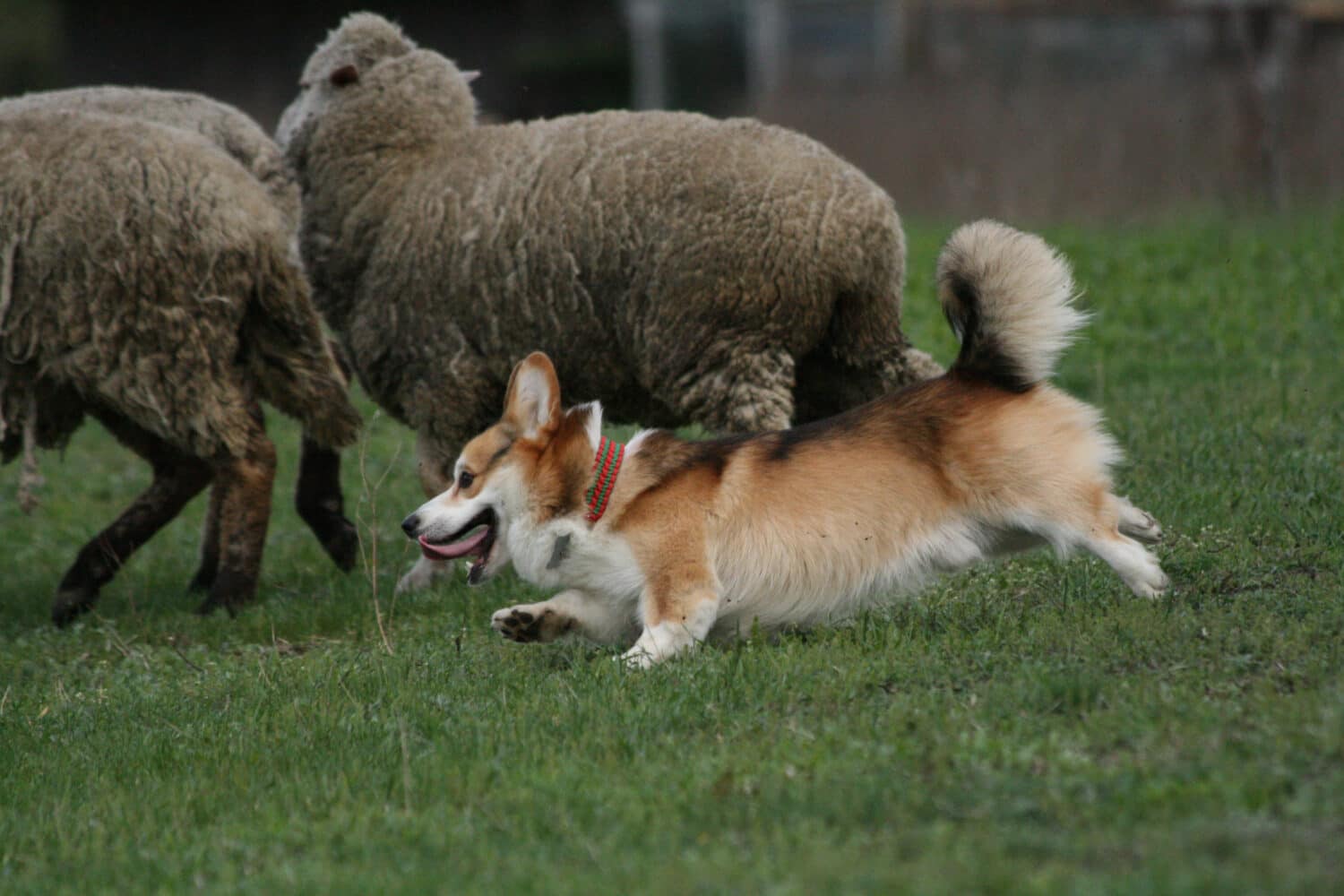
Corgis are the eleventh smartest and the eleventh most popular dog breed according to the American Kennel Club.
©Pixel-Shot/Shutterstock.com
Good looks. Adorable personalities. Great swagger. Big brains. Royalty status. Lasting popularity. Some dogs just have it all. This is certainly the case with corgis – one of the smartest breeds of dogs on earth. Beloved by the Queen of England, who helped bring them back into fashion, these small working animals pack a big punch of intelligence and affection in a little package. Weighing between 20-30 pounds on average, they are capable of doing hard labor and snuggling at the same time.
Although humans often confuse them, there are actually two different types of corgis: the Pembroke Welsh corgi and the Cardigan Welsh corgi. As these names imply, both originate from Wales. In Welsh, corgi translates to dwarf dog – which makes sense since both distinct types are relatively small in stature. The Pembroke corgis tend to be charming, energetic party animals, often displaying a lively and assertive demeanor. In human terms, we might think of them as extroverts. Famous for their fox-like heads and shorter tails, Pembroke corgis are quick learners – making them popular choices for dog sports and agility training. These high-spirited, zestful dogs need lots of mental and physical stimulation and exercise to keep their active brains engaged.
Conversely, Cardigans – distinguishable by their long tails and rounded ears – are more thoughtful, deliberate, and reserved. Slightly uneasy in new situations, they are more like the introverts of the canine world. Nevertheless, they rapidly become more comfortable in changing environments with a little time and patience. Cardigans are also a little bit easier to handle. While they enjoy long bouts of exercise, they still find satisfaction in a quick romp, too. Even though both types share a herding background and an intelligent disposition, their distinct qualities reveal the fascinating diversity and versatility of the corgi breed.
Corgis are the Eleventh Most Intelligent Breed

Corgis are intelligent, learn and adapt quickly, and have strong work ethics.
©Kristina Holovach/Shutterstock.com
As you may have already suspected, corgis are super sharp. But how do we know? Who measures canine intelligence? And what is their reasoning? For a little history, professor and renowned author, Stanley Coren, ignited a revolution with a groundbreaking study on canine cognition. An expert in neuropsychology, Coren quantified canine intelligence in his 1994 book, The Intelligence of Dogs: Guide to the Thoughts, Emotions, and Inner Lives of Our Canine Companions, later republished in 2006. In his work, he ranks corgis as the eleventh most intelligent breed overall.
Coren’s book outlines three essential dimensions of canine intelligence: instinctive, adaptive, and working and obedience intelligence. The first pertains to a dog’s proficiency in tasks she was bred to accomplish, such as herding, pointing, fetching, guarding, or providing companionship. In essence, it calculates how they perform when following the instincts we have instilled in them via breeding.
The second dimension evaluates a dog’s capacity for independent problem-solving, measuring how quickly they can adjust their behavior or attempt novel approaches to achieve desired outcomes.
The third dimension involves a dog’s ability to learn from and interact with people. Together, these assessments, although not without limitations, offer insights into how dogs perceive the world, surmount challenges, learn, obey, and communicate.
To establish a hierarchy of canine cognition, Coren’s methodology involved seeking evaluations from obedience trial judges affiliated with the American and Canadian Kennel Clubs. Approximately 199 responses were collected, providing insights from roughly 50 percent of active judges in North America at that time. Impressively, a consensus emerged among these experts regarding specific breeds consistently displaying working and obedience intelligence. Predictably, border collies, renowned for their brilliance, consistently secured top ranks, alongside poodles, German shepherds, golden retrievers, Doberman pinschers, and indeed, corgis. Essentially, intelligent dogs consistently follow commands, understand instructions, tackle challenging tasks, and more. In these tests, corgis stand out among their peers.
Tiny But Mighty

Corgis may be small, but their size actually gives them several advantages when herding, including the ability to avoid being kicked by livestock.
©Inessa Melikova/Shutterstock.com
Don’t let their diminutive size fool you. Corgis may be tiny, but they are still mighty. As working dogs, they love and excel at their jobs. Originating from Wales, versatile, agile corgis are well suited for herding cattle, sheep, and other livestock. In their duties as herding dogs, their low stature is actually a huge advantage – giving them a paw up, so to speak, in avoiding kicks and nimbly managing errant animals. Corgis likewise have an impressive work ethic and have therefore been indispensable on farms, where they skillfully round up livestock. With razor-sharp attentiveness, quick reflexes, innate herding instincts, a desire to please, and the ability to learn, corgis are powerful partners in agricultural endeavors.
Put another way, corgis’ intelligence stems from a heritage of herding, where quick decision-making and problem-solving were essential. Adept learners, they display strong communication skills and a high energy drive. Their social and interactive nature further enhances their ability to comprehend commands and engage effectively with humans, while their drive, ambition, and adaptability round out their reputation as wise and loving companions.
They are also the cutest guard dogs in the history of ever. Loyal and vigilant, they are masters of communication and immediately alert their humans to potential intruders and other threats. Corgis can work, protect, and love in equal measure.
Keep Your Cute Corgi Entertained
Most corgis living in modern homes are no longer expected to get up and herd cattle or sheep. And while it is easy to imagine these sweet, quirky creatures lounging around eating the canine version of bonbons, they actually need something more challenging to do. Monotony and unstimulating environments are the stuff of nightmares for vibrant and lively working dogs. Those bred for jobs, like corgis, yearn for mental and physical engagement. As they say, a good dog is a tired dog. Thus, ensuring your corgis remain busy and adequately exercised is super important for their well-being. And it will also help keep you sane at the same time since bored dogs are often destructive and anxious.
Transforming the world into an enjoyable realm for your dog to explore and play in is called enrichment. The good news is that keeping your smart corgi entertained does not have to be intricate or costly. Crafting homemade toys, giving them interactive puzzles, embarking on outdoor escapades, teaching them new tricks, and employing positive reinforcement training all contribute to maintaining their happiness and vitality.
Because corgis are little stars in sports, agility and obedience work can do a lot for their health. With their dynamic and challenging setups, agility courses test a dog’s ability to learn, as well as improve their speed and test their obedience. Usually, these courses involve a sequence of fun obstacles – including jumps, tunnels, weave poles, and A-frames, which dogs learn to navigate through in a specific order within a set time frame. The courses promote physical fitness, mental sharpness, and teamwork between you and your corgi. By guiding your corgi through a course using verbal cues and gestures, they can practice following commands and gain confidence simultaneously. Agility training will enhance your corgi’s athleticism and acumen. More importantly, it will strengthen your already fantastic bond.
Final Note on Training
Whether you and your corgi are using an agility course or playing in your backyard, remember to always use positive reinforcement methodologies to train them. Many popular training approaches operate under the false assumption that dogs need to be “dominated” and employ techniques that cause pain, fear, or stress. These are neither efficient nor ethical. In fact, research has exposed the harmful impact of aversive methods that rely on punishment. Shocking, hitting, reprimanding, choking, or otherwise terrifying your dog not only jeopardizes their well-being but can even worsen unwanted behaviors. Instead, working with your corgis should be enjoyable for both of you. By using positive reinforcement, you can captivate the attention of your very smart corgi.
The photo featured at the top of this post is © Masarik/Shutterstock.com
Ready to discover the top 10 cutest dog breeds in the entire world?
How about the fastest dogs, the largest dogs and those that are -- quite frankly -- just the kindest dogs on the planet? Each day, AZ Animals sends out lists just like this to our thousands of email subscribers. And the best part? It's FREE. Join today by entering your email below.
Thank you for reading! Have some feedback for us? Contact the AZ Animals editorial team.







